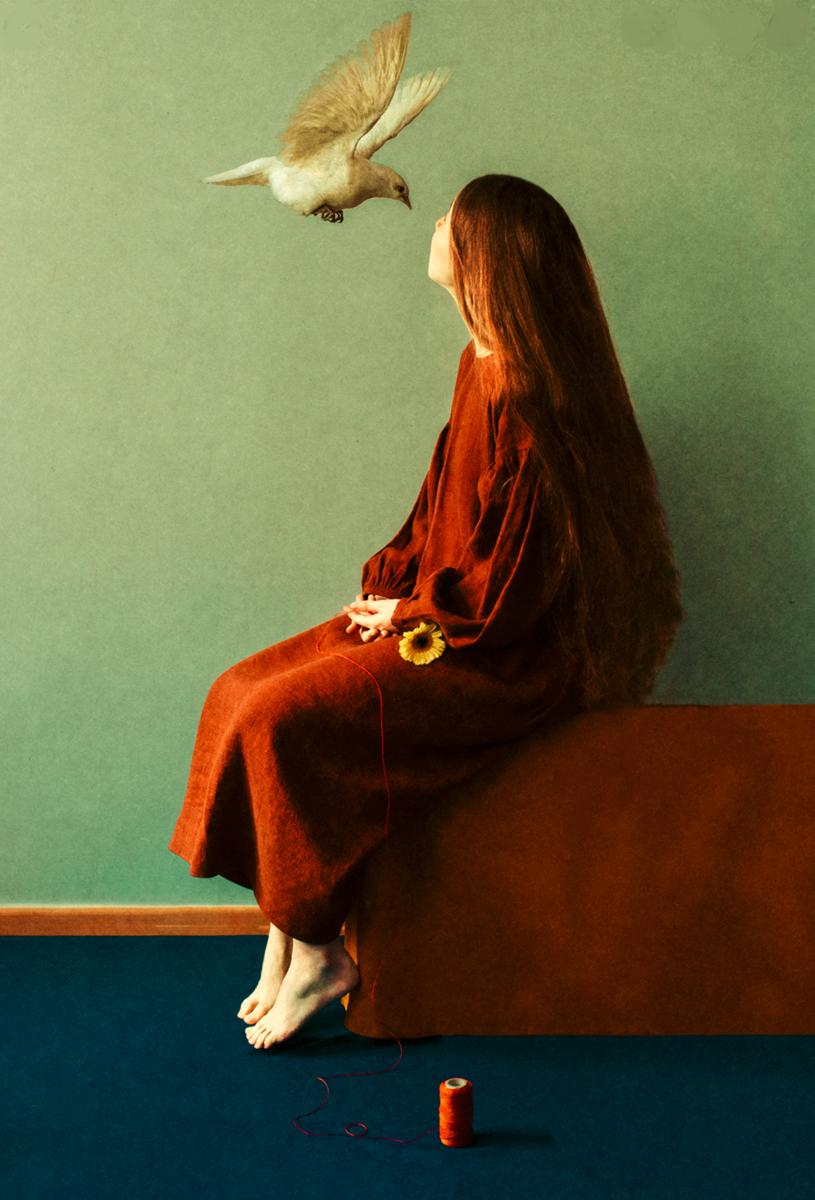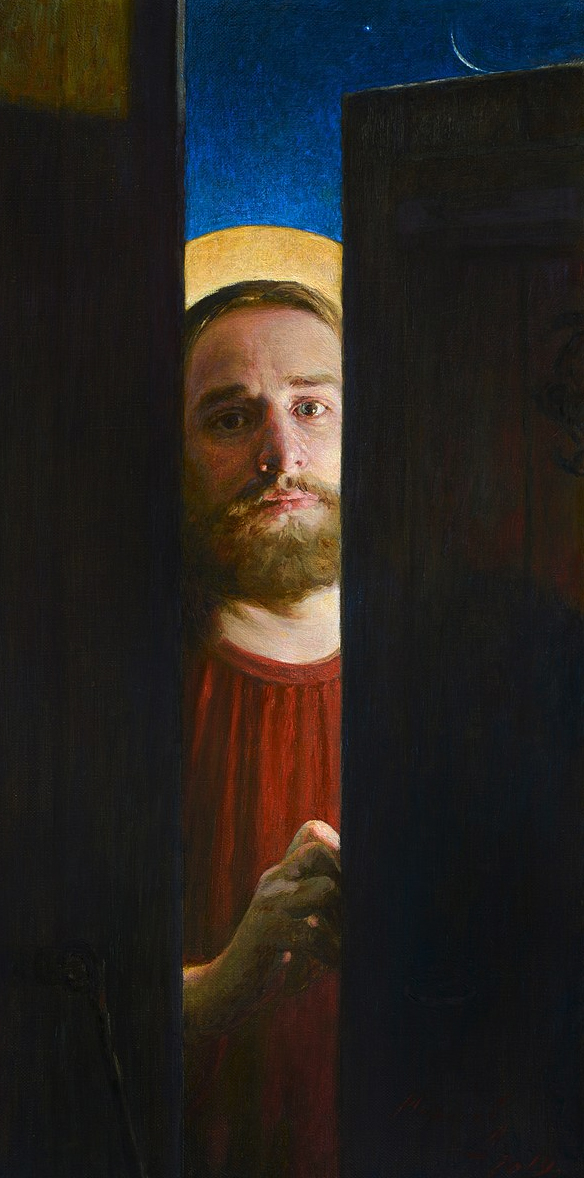December 28: My Gift to Christ
♫ Music:
Day 32 - Wednesday, December 28
Title: MY GIFT TO CHRIST
Scripture #1: Luke 1:38
Then Mary said, “Behold the maidservant of the Lord! Let it be to me according to your word.” And the angel departed from her.
Scripture #2: Revelation 3:20
“Behold, I stand at the door and knock. If anyone hears My voice and opens the door, I will come in to him and dine with him, and he with Me.”
Poetry & Poet:
“Birth of Christ”
by Rainer Maria Rilke
Had you not simplicity, then how
should this befall you which illuminates the night?
The god, who thundered above the peoples, now
makes himself mild and comes in you to light
the world. Did you imagine him as greater?
What is greatness? Straightway through all matter
where he passes moves his downright fate.
Even a star has no such highway. See,
these kings are great.
They drag before your lap
treasure which they deem the very greatest,
and you’re astonished at these gifts perhaps—
but see here in the foldings of your shawl
how he already has surpassed them all.
All amber that ships carry far away,
the golden ornaments and overcloying
spices stealing in the senses: yet
all these were fleeting things that made no stay.
and finally one has little but regret.
But—you will soon know it—He brings joy.
“LET IT BE UNTO ME”
Mary presents one of the most inspiring but also, perhaps, befuddling examples of faith found in the Bible. Inspiring because Mary’s submission to God is so total and seems so effortless—“Behold the maidservant of the Lord.” Luke’s account especially heightens our sense of her faith, introducing it immediately after relating the angelic annunciation of Zechariah’s imminent fatherhood. “How can I be sure of this?” he asks Gabriel. “I am an old man and my wife is well along in years.” It’s not doubt. It’s old fear disguised by the request for evidence in a hope to fend off disappointment. Zechariah is a man who respects the power of sorrow and attempts to manage it—as we all do—by hedging his bets and asking for assurances.
Not so with Mary. Mary’s faith is befuddling because her obedience seems so total and sudden, emerging without apparent backstory. We learn only that she is “highly favored.” What has she done to be regarded with such favor? What life of faith has she led? How does such faith follow favor when Luke tells us that Zechariah and Elizabeth, too, were “righteous in the sight of God, observing all the Lord’s commands and decrees blamelessly”?
Comparing them, Luke invites us to see there are some occasions where success is not a matter of past experience, training, or knowledge. Indeed, sometimes these prove obstacles rather than aids. They can foster hesitation when the call of God is immediate and clear. As with Gabriel’s visitation to Mary, the passage from Revelation announces that the call of Christ often comes in plain terms whose meaning we comprehend on a visceral, sensory level. “Behold, I stand at the door and knock.” The example is a universal experience: minding your own business in your room or home, you hear an unexpected sound at the door. Someone is out there. Will you open the door or not? We recognize the sound for what it is, and almost immediately decide whether or not to open the door, performing a basic action in which experience, training, or knowledge are irrelevant.
What Mary seems to possess, among other things, is, in Rilke’s words, simplicity. We see simplicity in Annunciation by Laura Makabresku, where Mary’s dress has been woven—and continues to be woven—from a single thread. The dress is unadorned and uniform in color—like the jade wall, the brown bed, and the blue floor. The uncluttered, unbusy state of her clothing and room emphasize the painting’s focal point as the open space between her gaze and the Spirit in the form of a dove. And like her room, Mary’s posture itself is relaxed and modest. She is focused—undistracted. The second painting serves as a counterpoint, offering the emotional perspective of Zechariah. The door has been opened conditionally—to cautiously appraise the visitor. Christ’s countenance mingles recognition with sadness, beginning to comprehend that though He deserves welcome and hospitality, He is instead regarded with suspicion. The cracked door might yet close Him out again.
I stand too often at the brink of this half-hearted threshold. My Lord, whom I know, knocks, beckons, invites. But I have questions and reservations. Rilke’s poem anticipates and dispels them with his own: “Did you imagine him as greater? / What is greatness?” When Zechariah asks Gabriel, “How can I be sure of this,” he is asking Gabriel—and therefore God—to certify his promises by appealing to evidence; to a “greatness” that Zechariah has come to know and trust. Rilke’s poem scornfully dispenses with the things upon which we found our credulity: “golden ornaments and overcloying / spices stealing in the senses…fleeting things that made no stay.”
Mary believes Gabriel, at least in part, because she can dismiss her experience and expectations. They do not establish conditions God is obliged to meet; they do not define what is possible or impossible. His providence operates, indeed, wholly outside them. Yet my experiences and training have taught me to reckon various forces, people, or events as “great.” And this is useful in some of my day to day affairs. But when God knocks at my door, or makes His invitation, I cannot walk in faith if I hold God hostage to human standards. He will not meet them. I, instead, must submit to His greatness, though it defies all I know, remember, or imagine.
Prayer:
Lord Jesus Christ, we hear you knock upon our door. We know you invite us to walk by faith in fellowship with You. But we often hesitate or stall because we are afraid and insist that you submit your plans and methods to our approval. We often do this without even realizing it. Please forgive our arrogance and doubt. Help us recognize these instincts and habits, and to submit ourselves in joy to your invitation and to your greatness. Help us to recognize and believe that nothing is impossible for you, and that in your greatness is greatest joy.
Amen.
Dr. Phillip Aijian
Adjunct Professor
Torrey Honors College
Biola University
For more information about the artwork, music, and poetry selected for this day, we have provided resources under the “About” tab located next to the “Devotional” tab.
About the Artwork #1:
Annunciation
Laura Makabresku
2020
Color photograph
About the Artist #1:
Laura Makabresku (b. 1987) is an photographic artist who lives and works in Poland, seeking to honor the Lord with her work.
About the Artwork #2:
Guest
Andrei Miranov
2019
Oil on canvas
23.6 x 11.8 cm
About the Artist #2:
Andrei Mironov (b. 1975) was born in Russia. His paintings and prints focus on religious themes that portray his Christian beliefs and ideals. His oil paintings of biblical scenes are reminiscent of the artist Caravaggio with their dramatic lighting and detailed portraits. Self-educated in painting, Mironov has worked as a portraitist since 2005. In 2007, he won the title "Profi" at Russian Art Week in Moscow. His participation in the First Chechen War as well as his police work has had a considerable influence on his artistic development. The artist defined Christianity as "the main theme of his oeuvres.” Today his paintings are found in private collections, in the Kashira local museum, in the Monastery of Our Lady of Kazan, and in the St. Nicholas Church in Yamskaya Sloboda (Ryazan).
https://en.wikipedia.org/wiki/Andrei_Mironov_(painter)
About the Music:
“Thou Didst Leave Thy Throne” (single)
Lyrics:
Thou didst leave Thy throne and Thy kingly crown,
When Thou camest to earth for me;
But in Bethlehem’s home was there found no room
For Thy holy nativity.
O come to my heart, Lord Jesus.
There is room in my heart for Thee.
Heaven’s arches rang when the angels sang,
Proclaiming Thy royal degree;
But of lowly birth didst Thou come to earth,
And in great humility.
O come to my heart, Lord Jesus,
There is room in my heart for Thee.
When the heavens shall ring, and the angels sing,
At Thy coming to victory,
Let thy voice call me home, saying “Yet there is room,
There is room at My side for thee.”
When Thou comest and callest for me.
About the Performers:
Parkside Evangelical Church is a small church located in Littlehampton, West Sussex, England.
About the Lyricist:
Emily Elizabeth Steele Elliott (1836–1897) was a British author, hymn writer, and editor. She has written hymns, some of which have obtained worldwide acceptance and usage. Elliott's hymn, "Thou Didst Leave Thy Throne,” was first printed in a leaflet and first used at St. Mark's Church in Brighton in 1864. The tune was composed for this text by Timothy R. Matthews, an English clergyman and musician.
https://www.umcdiscipleship.org/resources/thou-didst-leave-thy-throne-o-come-to-my-heart-lord-jesus
https://hymnary.org/person/Elliott_EmilySteele
About the Composer:
Timothy Richard Matthews (1826–1910) was an author, arranger, and editor born in Colmworth, England. In 1853 he became a private tutor to the family of Rev. Lord Wriothesley Russell, a canon of St. George’s Chapel, Windsor Castle, where he studied under organist George Elvey. After serving as the curate of St. Mary’s Church in Nottingham (1853–1869) and later as the rector at North Coates, Lincolnshire (1869–1907), he retired in 1907 to live with his eldest son at Tetney vicarage. There he composed morning and evening services, chants, and responses, earning a reputation for simple but effective hymn tunes, writing over one hundred of them. His sons, Norton and Arthur, were also known as hymn-tune composers.
https://hymnary.org/person/Matthews_Timothy
About the Arrangement:
Craig Courtney (b. 1948), a native of Indiana, began playing the piano at the age of three and the cello at the age of eleven. He received a B.A. and an M.A. in piano performance from the University of Cincinnati. Following a three-year stay in Milan, Italy, where Mr. Courtney studied and worked extensively as a vocal coach, he was invited to join the music faculty of the famed Mozarteum in Salzburg, Austria. During this period, while serving in the music ministry of the Salzburg International Baptist Church, Courtney began directing a church choir and composing sacred choral music. In 1985, his compositions came to the attention of John Ness Beck, through the publication of his octavo Thy Will Be Done, initiating a close working relationship between the two men which continued until Beck's death in 1987. In making plans for the continuation of Beckenhorst Press, Beck appointed Courtney to assume his responsibilities as staff composer and editor. At this point in time, Mr. Courtney's published works include more than one hundred sixty choral octavos, eight vocal collections, a piano solo collection, and six extended works for choir and orchestra. In demand throughout the country as a choral clinician and featured composer, Courtney now resides in Columbus, Ohio.
https://www.ecspublishing.com/composers/c/craig-courtney.html
https://www.lamasterchorale.org/Composer.php?composer_id=794
About the Poetry & Poet:
Rainer Maria Rilke (1875–1926) was a Bohemian Austrian poet and novelist, "widely recognized as one of the most lyrically intense German-language poets," writing in both verse and highly lyrical prose. Several critics have described Rilke's work as inherently "mystical." His writings include one novel, several collections of poetry, and several volumes of correspondence in which he invokes haunting images that focus on the difficulty of communion with the ineffable in an age of disbelief, solitude, and profound anxiety.
https://en.wikipedia.org/wiki/Rainer_Maria_Rilke
https://www.poetryfoundation.org/poets/rainer-maria-rilke
About the Devotion Author:
Dr. Phillip Aijian
Adjunct Professor
Torrey Honors College
Biola University
Phillip Aijian holds a Ph.D. in Renaissance drama and theology from UC Irvine, as well as an M.A. in poetry from the University of Missouri. He teaches literature and religious studies and has published in journals like ZYZZYVA, Heron Tree, Poor Yorick, and Zocalo Public Square. He lives in California with his wife and children.
https://www.phillipaijian.com/
https://californiospress.com/2020/02/02/write-to-me-an-interview-with-poet-phillip-aijian/

